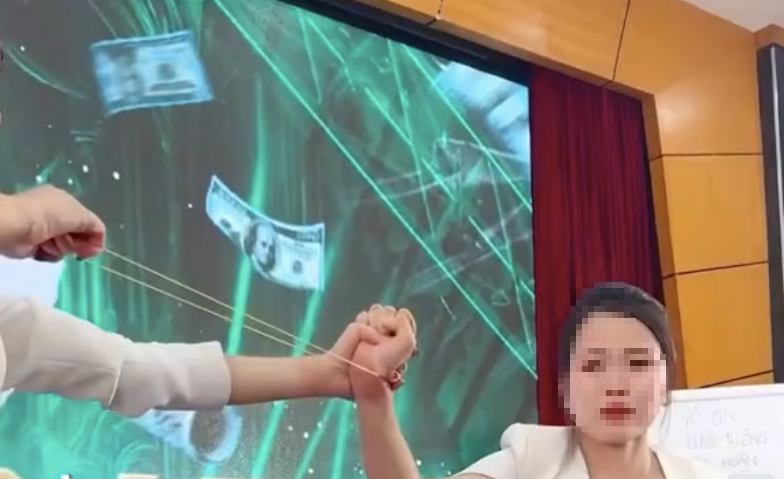In recent days, social media has been abuzz with a video depicting a “CEO snapping a rubber band on an employee’s hand” as a form of punishment for lack of effort and failure to meet KPIs (Key Performance Indicators). This unusual form of discipline has sparked a lot of discussions and reactions online.
Paying to Join the System
Soon after the video surfaced, a social media account belonging to Hoàng Phi Huyền, CEO of Huyền Phi Cosmetics, confirmed that she was, indeed, the boss in the video. She explained that the rubber band-snapping game was meant to illustrate the power of teamwork, unity, and the sacrifices made by leaders.
Upon investigation, it was found that Huyền Phi Cosmetics is operated by Huyền Phi Cosmetics Company Limited, established in May 2017 and headquartered in Cau Giay District, Hanoi. The founding shareholders are Mr. Hoang Van Hung and Mrs. Hoang Thi Thu Huyen, each holding 50% of the capital. Their main business is wholesale trading of perfumes, cosmetics, and sanitary preparations.
The company operates through a distribution system spanning multiple provinces and cities across the country. To become a part of the Huyền Phi Cosmetics distribution network, individuals have to invest a minimum of 5 million VND (for a branch position) up to 300 million VND (for a level 1 distributor). The company employs various attractive strategies to lure participants, such as continuous online and offline training, organizing conferences in luxurious venues, offering sales incentives, and providing travel opportunities. The images that have been circulating on social media in the past few days are also from the company’s distributor training sessions.
Despite their seemingly attractive offerings, Huyền Phi Cosmetics has run into trouble with the law on multiple occasions. They have been penalized and had their products recalled for containing prohibited substances, violating advertising regulations, and selling products of unknown origin.
In an interview with the NLD reporter, Mr. Vo Dan Mach, Secretary-General of the Vietnam Multi-level Marketing Association, bluntly stated that this is a form of disguised and fraudulent multi-level marketing. Many individuals and groups in the market are currently operating similar systems. These systems are created by individuals who manipulate emotions and use social media to devise all sorts of gimmicks to advertise and create a buzz.
The Secretary-General of the Association further explained that legitimate multi-level marketing involves listing product prices on websites, and participants are not required to invest money or participate in get-rich schemes. On the other hand, disguised multi-level marketing involves individuals setting up companies to produce cosmetics, functional foods, etc., with obscure origins, and advertising them as “miracle cures.” This gives rise to agencies, general agencies, and distributors, or what is colloquially referred to as “squads and battalions” to herd “chickens” (customers), enticing others to join by buying products with promises of easy money and high rewards.
In reality, many people have fallen victim to this form of business. Ms. T.H. from Vinh Phuc province shared her experience of losing more than 20 million VND by becoming an agent for functional food products. With an average box price ranging from 500,000 VND to 2 million VND and a commission of 30-40% per box, she ended up selling the products to her family and realized she had been scammed when no one else bought them. She decided to quit being an agent and accepted her financial loss.

Rubber band-snapping and rose-stepping are psychological manipulation tactics. Source: Screenshot
Number of Enterprises Decreases, but Activities Increase
Another scam involves fundraising. In late 2023, the Hanoi Police exposed a scheme where thousands of investors were lured into investing in a project to grow and care for Panax vietnamensis (a rare medicinal plant) in the provinces of Kon Tum and Quang Nam, offering interest rates of 24-48%. The perpetrator, Pham My Hanh, Chairman of My Hanh Group, embezzled more than 600 billion VND.
According to statistics from the National Competition Committee (under the Ministry of Industry and Trade), the number of registered multi-level marketing enterprises has significantly decreased from 67 in 2016 to 20 by the end of 2023. However, this form of business shows no signs of slowing down, and there has been an increase in the number of individuals exploiting the multi-level marketing model or its variations for fraudulent purposes, leading to increasingly complex developments.
Attorney Nghiem Quang Vinh, Director of Nghiem Quang Law Company (Hanoi Bar Association), stated that while Vietnamese law does not prohibit multi-level marketing, taking advantage of it for fraudulent purposes is punishable. According to the 2023 Law on Consumer Protection, requiring a deposit, payment, or purchase of a certain quantity of goods to join a multi-level marketing network is prohibited.
Mr. Vinh mentioned the practice of herding “chickens” to buy products and pay to join the system. In these cases, the perpetrators often prey on people’s greed to defraud them of their money. Therefore, Attorney Vinh emphasized the need for the state to raise awareness about the true nature of legitimate and disguised multi-level marketing to prevent people from falling into such traps.
The Secretary-General of the Multi-level Marketing Association shared that no agency regulates these disguised multi-level marketing schemes. For the authorities to intervene, there must be witnesses or victims coming forward with complaints, which is often challenging as even those who have lost everything may not realize they have been scammed.
The Association’s leadership stated that for member companies, the association would handle complaints to protect participants’ rights. For non-member companies, the association would refer the matter to the police or relevant agencies to protect the interests of those involved.
“More importantly,” Mr. Mach stressed, “there is a need to strengthen the propagation of disguised multi-level marketing forms, focusing on target groups such as students and housewives.”
The Ministry of Industry and Trade also stated that for disguised multi-level marketing cases outside their scope of management, the ministry would enhance propaganda and warning campaigns to raise public awareness of the manifestations of this business model. Additionally, they will coordinate with relevant ministries, sectors, and especially the police to strictly handle violations, thereby increasing deterrence and preventing negative impacts on society.
90% of Multi-level Marketers Fail the Knowledge Test
The National Competition Committee has recently issued a decision recognizing the results of the legal knowledge test on multi-level marketing and the knowledge test for local focal points organized in Ho Chi Minh City in August 2024. Surprisingly, more than 90% of multi-level marketers failed to pass this exam. Out of 11 participating enterprises, 8 enterprises had a failure rate of 100%. Additionally, only 7 out of 19 local focal points passed the knowledge test for multi-level marketing.
The Female Entrepreneur Behind the Aloe Vera Multi-Level Ecosystem
Aloe Vera Company has a troubled history with regulatory authorities, having been inspected and penalized multiple times for violations in their multi-level marketing practices. This company is part of the Lien Hoa Group ecosystem, chaired by none other than Trương Thị Nhi, the head of the Vietnam Multi-level Marketing Association.
What Companies Are Allowed to Conduct Multi-Level Marketing in Hai Duong Province?
According to the Hai Duong Department of Industry and Trade, there are currently 12 enterprises confirmed by the Department to be operating in multi-level marketing in Hai Duong, a decrease of 2 enterprises compared to the same period in 2023.
















